Civil Law Case Study: Foreign Influence Transparency Scheme Act 2018
VerifiedAdded on 2022/11/11
|6
|1184
|62
Case Study
AI Summary
This document presents a civil law case study that examines whether Amelia is liable under Section 57(3A) of the Foreign Influence Transparency Scheme Act 2018 (Cth). The case involves Amelia's support for a viewpoint regarding the eviction of non-Australians from the Mawson base in Antarctica. The analysis involves statutory interpretation, focusing on the Acts Interpretation Act 1901 (Cth) and relevant provisions of the Foreign Influence Transparency Scheme Act. The document explores the purpose rule, literal rule, golden rule, and mischief rule of interpretation. It concludes that Amelia's actions, including expressing her opinion, do not constitute a violation of the Act, emphasizing her freedom of speech as an Australian citizen and the absence of direct involvement with a foreign principal. The conclusion is supported by references to relevant legislation, books, and websites.
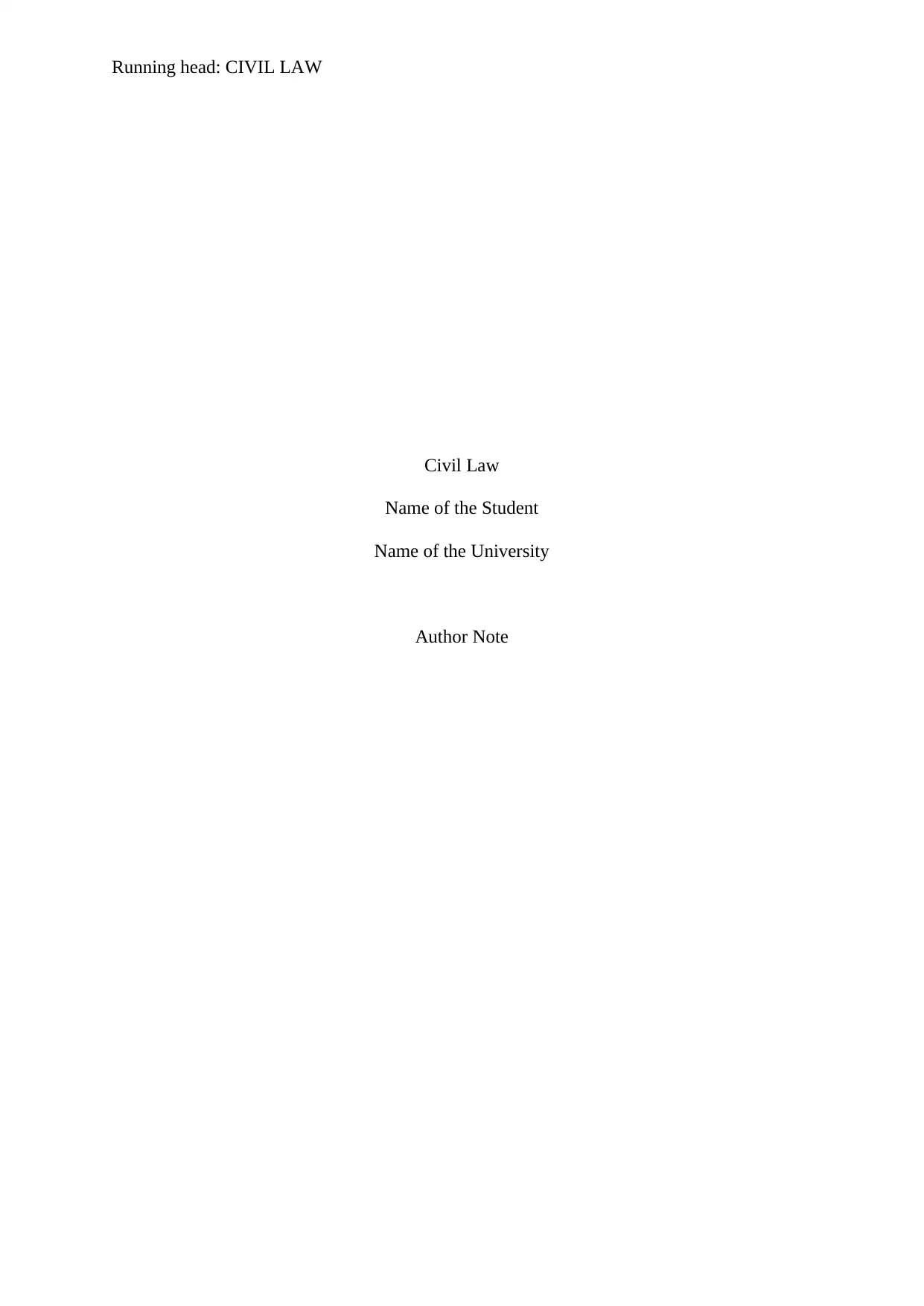
Running head: CIVIL LAW
Civil Law
Name of the Student
Name of the University
Author Note
Civil Law
Name of the Student
Name of the University
Author Note
Paraphrase This Document
Need a fresh take? Get an instant paraphrase of this document with our AI Paraphraser
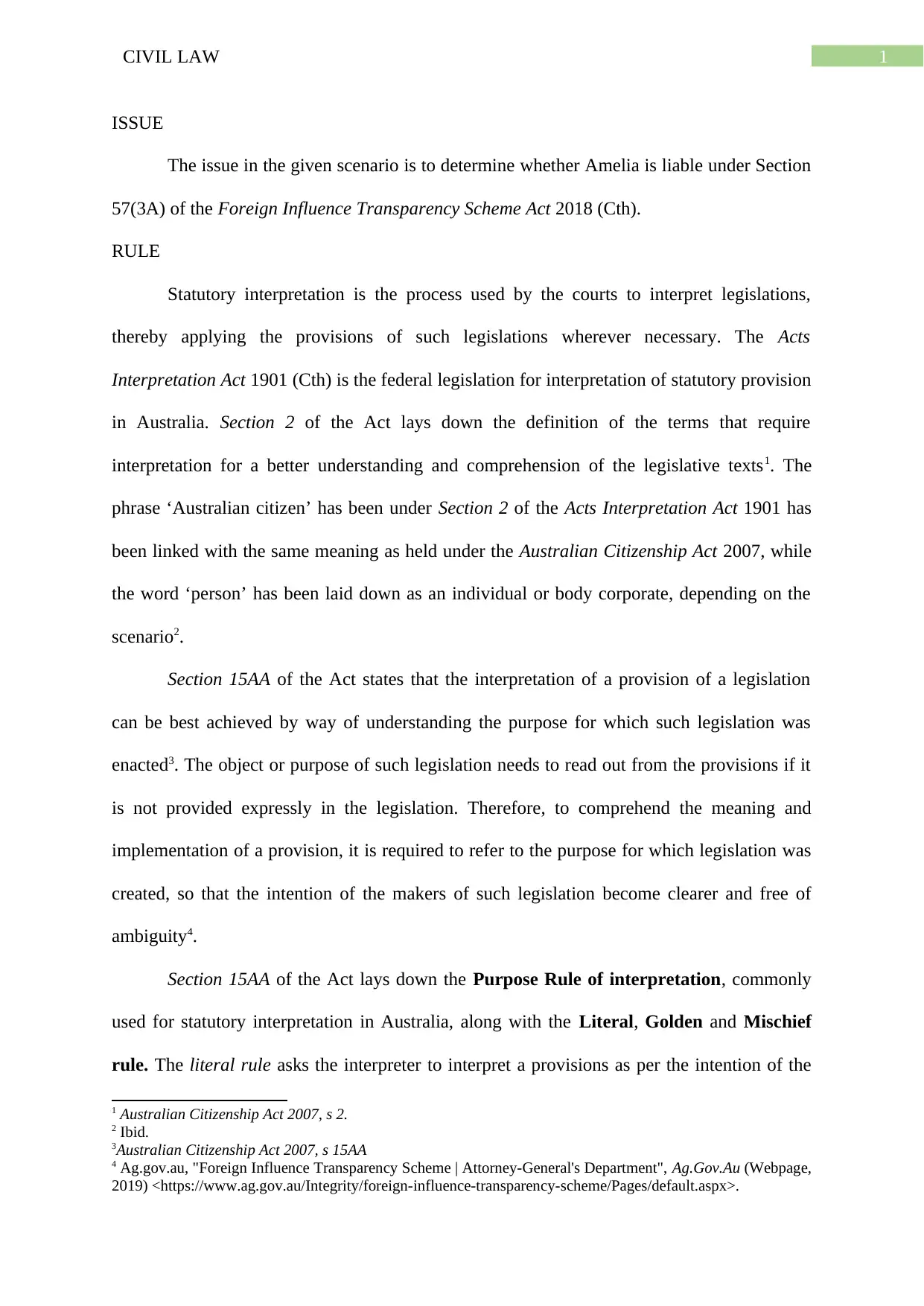
1CIVIL LAW
ISSUE
The issue in the given scenario is to determine whether Amelia is liable under Section
57(3A) of the Foreign Influence Transparency Scheme Act 2018 (Cth).
RULE
Statutory interpretation is the process used by the courts to interpret legislations,
thereby applying the provisions of such legislations wherever necessary. The Acts
Interpretation Act 1901 (Cth) is the federal legislation for interpretation of statutory provision
in Australia. Section 2 of the Act lays down the definition of the terms that require
interpretation for a better understanding and comprehension of the legislative texts1. The
phrase ‘Australian citizen’ has been under Section 2 of the Acts Interpretation Act 1901 has
been linked with the same meaning as held under the Australian Citizenship Act 2007, while
the word ‘person’ has been laid down as an individual or body corporate, depending on the
scenario2.
Section 15AA of the Act states that the interpretation of a provision of a legislation
can be best achieved by way of understanding the purpose for which such legislation was
enacted3. The object or purpose of such legislation needs to read out from the provisions if it
is not provided expressly in the legislation. Therefore, to comprehend the meaning and
implementation of a provision, it is required to refer to the purpose for which legislation was
created, so that the intention of the makers of such legislation become clearer and free of
ambiguity4.
Section 15AA of the Act lays down the Purpose Rule of interpretation, commonly
used for statutory interpretation in Australia, along with the Literal, Golden and Mischief
rule. The literal rule asks the interpreter to interpret a provisions as per the intention of the
1 Australian Citizenship Act 2007, s 2.
2 Ibid.
3Australian Citizenship Act 2007, s 15AA
4 Ag.gov.au, "Foreign Influence Transparency Scheme | Attorney-General's Department", Ag.Gov.Au (Webpage,
2019) <https://www.ag.gov.au/Integrity/foreign-influence-transparency-scheme/Pages/default.aspx>.
ISSUE
The issue in the given scenario is to determine whether Amelia is liable under Section
57(3A) of the Foreign Influence Transparency Scheme Act 2018 (Cth).
RULE
Statutory interpretation is the process used by the courts to interpret legislations,
thereby applying the provisions of such legislations wherever necessary. The Acts
Interpretation Act 1901 (Cth) is the federal legislation for interpretation of statutory provision
in Australia. Section 2 of the Act lays down the definition of the terms that require
interpretation for a better understanding and comprehension of the legislative texts1. The
phrase ‘Australian citizen’ has been under Section 2 of the Acts Interpretation Act 1901 has
been linked with the same meaning as held under the Australian Citizenship Act 2007, while
the word ‘person’ has been laid down as an individual or body corporate, depending on the
scenario2.
Section 15AA of the Act states that the interpretation of a provision of a legislation
can be best achieved by way of understanding the purpose for which such legislation was
enacted3. The object or purpose of such legislation needs to read out from the provisions if it
is not provided expressly in the legislation. Therefore, to comprehend the meaning and
implementation of a provision, it is required to refer to the purpose for which legislation was
created, so that the intention of the makers of such legislation become clearer and free of
ambiguity4.
Section 15AA of the Act lays down the Purpose Rule of interpretation, commonly
used for statutory interpretation in Australia, along with the Literal, Golden and Mischief
rule. The literal rule asks the interpreter to interpret a provisions as per the intention of the
1 Australian Citizenship Act 2007, s 2.
2 Ibid.
3Australian Citizenship Act 2007, s 15AA
4 Ag.gov.au, "Foreign Influence Transparency Scheme | Attorney-General's Department", Ag.Gov.Au (Webpage,
2019) <https://www.ag.gov.au/Integrity/foreign-influence-transparency-scheme/Pages/default.aspx>.
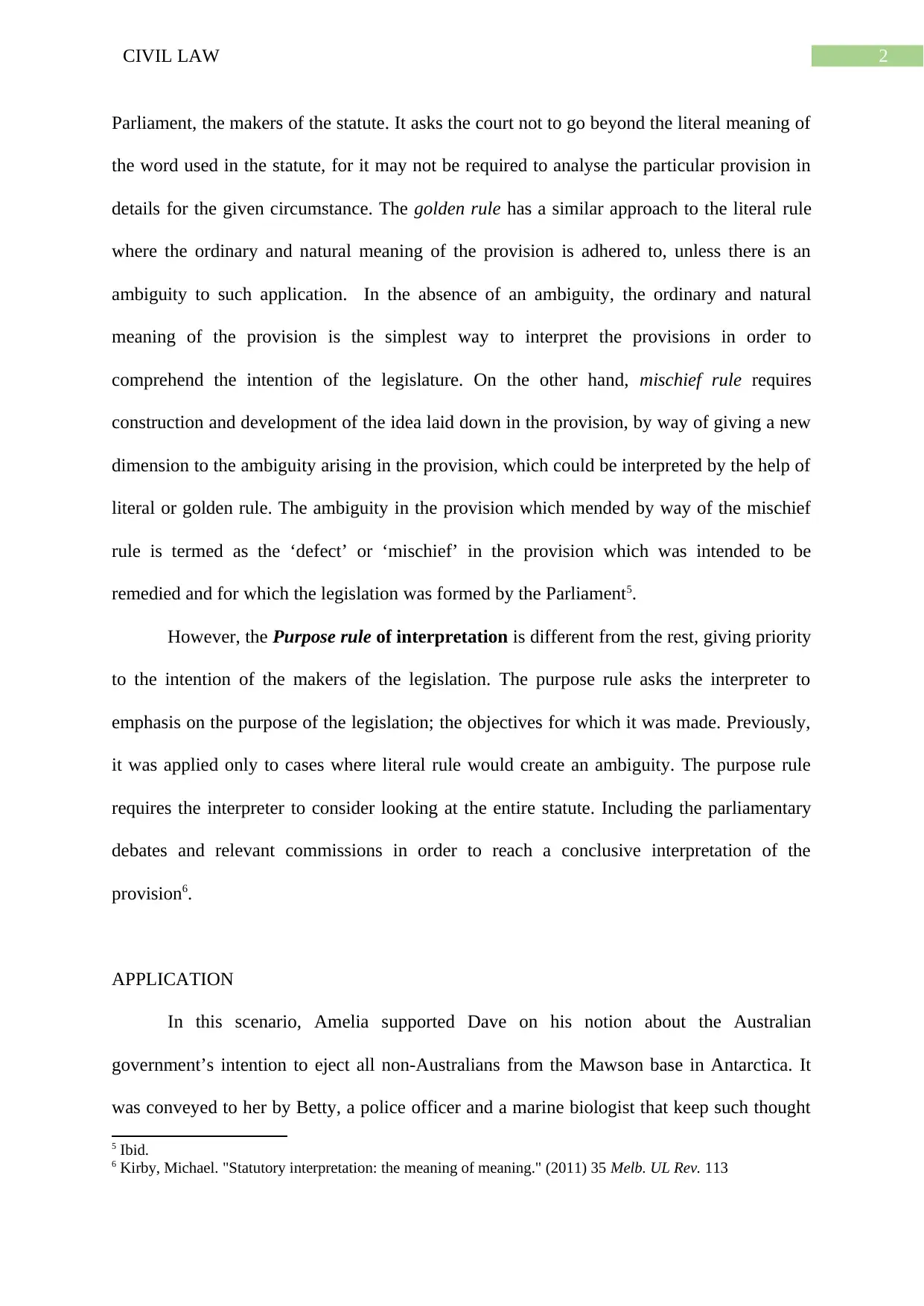
2CIVIL LAW
Parliament, the makers of the statute. It asks the court not to go beyond the literal meaning of
the word used in the statute, for it may not be required to analyse the particular provision in
details for the given circumstance. The golden rule has a similar approach to the literal rule
where the ordinary and natural meaning of the provision is adhered to, unless there is an
ambiguity to such application. In the absence of an ambiguity, the ordinary and natural
meaning of the provision is the simplest way to interpret the provisions in order to
comprehend the intention of the legislature. On the other hand, mischief rule requires
construction and development of the idea laid down in the provision, by way of giving a new
dimension to the ambiguity arising in the provision, which could be interpreted by the help of
literal or golden rule. The ambiguity in the provision which mended by way of the mischief
rule is termed as the ‘defect’ or ‘mischief’ in the provision which was intended to be
remedied and for which the legislation was formed by the Parliament5.
However, the Purpose rule of interpretation is different from the rest, giving priority
to the intention of the makers of the legislation. The purpose rule asks the interpreter to
emphasis on the purpose of the legislation; the objectives for which it was made. Previously,
it was applied only to cases where literal rule would create an ambiguity. The purpose rule
requires the interpreter to consider looking at the entire statute. Including the parliamentary
debates and relevant commissions in order to reach a conclusive interpretation of the
provision6.
APPLICATION
In this scenario, Amelia supported Dave on his notion about the Australian
government’s intention to eject all non-Australians from the Mawson base in Antarctica. It
was conveyed to her by Betty, a police officer and a marine biologist that keep such thought
5 Ibid.
6 Kirby, Michael. "Statutory interpretation: the meaning of meaning." (2011) 35 Melb. UL Rev. 113
Parliament, the makers of the statute. It asks the court not to go beyond the literal meaning of
the word used in the statute, for it may not be required to analyse the particular provision in
details for the given circumstance. The golden rule has a similar approach to the literal rule
where the ordinary and natural meaning of the provision is adhered to, unless there is an
ambiguity to such application. In the absence of an ambiguity, the ordinary and natural
meaning of the provision is the simplest way to interpret the provisions in order to
comprehend the intention of the legislature. On the other hand, mischief rule requires
construction and development of the idea laid down in the provision, by way of giving a new
dimension to the ambiguity arising in the provision, which could be interpreted by the help of
literal or golden rule. The ambiguity in the provision which mended by way of the mischief
rule is termed as the ‘defect’ or ‘mischief’ in the provision which was intended to be
remedied and for which the legislation was formed by the Parliament5.
However, the Purpose rule of interpretation is different from the rest, giving priority
to the intention of the makers of the legislation. The purpose rule asks the interpreter to
emphasis on the purpose of the legislation; the objectives for which it was made. Previously,
it was applied only to cases where literal rule would create an ambiguity. The purpose rule
requires the interpreter to consider looking at the entire statute. Including the parliamentary
debates and relevant commissions in order to reach a conclusive interpretation of the
provision6.
APPLICATION
In this scenario, Amelia supported Dave on his notion about the Australian
government’s intention to eject all non-Australians from the Mawson base in Antarctica. It
was conveyed to her by Betty, a police officer and a marine biologist that keep such thought
5 Ibid.
6 Kirby, Michael. "Statutory interpretation: the meaning of meaning." (2011) 35 Melb. UL Rev. 113
⊘ This is a preview!⊘
Do you want full access?
Subscribe today to unlock all pages.

Trusted by 1+ million students worldwide
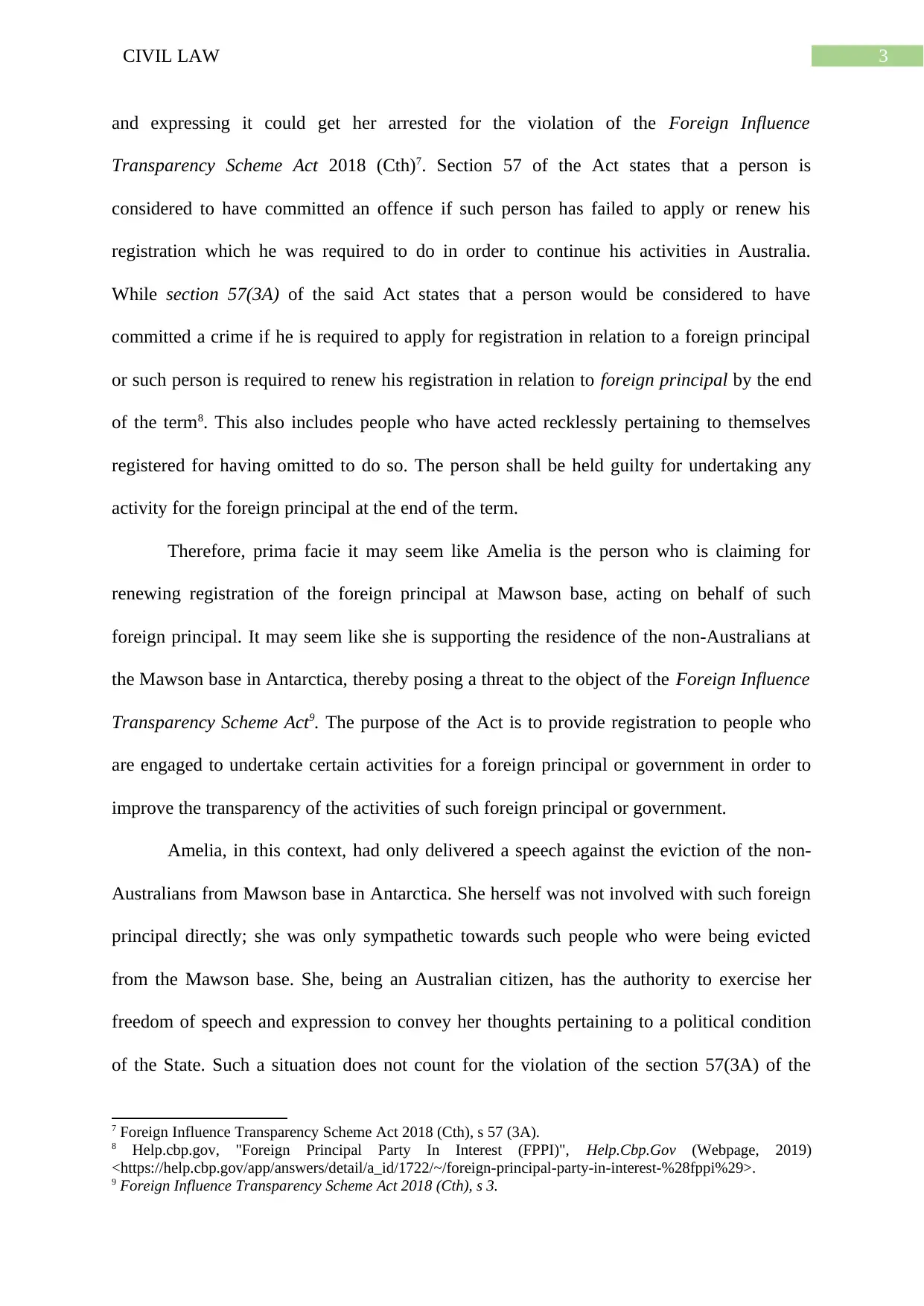
3CIVIL LAW
and expressing it could get her arrested for the violation of the Foreign Influence
Transparency Scheme Act 2018 (Cth)7. Section 57 of the Act states that a person is
considered to have committed an offence if such person has failed to apply or renew his
registration which he was required to do in order to continue his activities in Australia.
While section 57(3A) of the said Act states that a person would be considered to have
committed a crime if he is required to apply for registration in relation to a foreign principal
or such person is required to renew his registration in relation to foreign principal by the end
of the term8. This also includes people who have acted recklessly pertaining to themselves
registered for having omitted to do so. The person shall be held guilty for undertaking any
activity for the foreign principal at the end of the term.
Therefore, prima facie it may seem like Amelia is the person who is claiming for
renewing registration of the foreign principal at Mawson base, acting on behalf of such
foreign principal. It may seem like she is supporting the residence of the non-Australians at
the Mawson base in Antarctica, thereby posing a threat to the object of the Foreign Influence
Transparency Scheme Act9. The purpose of the Act is to provide registration to people who
are engaged to undertake certain activities for a foreign principal or government in order to
improve the transparency of the activities of such foreign principal or government.
Amelia, in this context, had only delivered a speech against the eviction of the non-
Australians from Mawson base in Antarctica. She herself was not involved with such foreign
principal directly; she was only sympathetic towards such people who were being evicted
from the Mawson base. She, being an Australian citizen, has the authority to exercise her
freedom of speech and expression to convey her thoughts pertaining to a political condition
of the State. Such a situation does not count for the violation of the section 57(3A) of the
7 Foreign Influence Transparency Scheme Act 2018 (Cth), s 57 (3A).
8 Help.cbp.gov, "Foreign Principal Party In Interest (FPPI)", Help.Cbp.Gov (Webpage, 2019)
<https://help.cbp.gov/app/answers/detail/a_id/1722/~/foreign-principal-party-in-interest-%28fppi%29>.
9 Foreign Influence Transparency Scheme Act 2018 (Cth), s 3.
and expressing it could get her arrested for the violation of the Foreign Influence
Transparency Scheme Act 2018 (Cth)7. Section 57 of the Act states that a person is
considered to have committed an offence if such person has failed to apply or renew his
registration which he was required to do in order to continue his activities in Australia.
While section 57(3A) of the said Act states that a person would be considered to have
committed a crime if he is required to apply for registration in relation to a foreign principal
or such person is required to renew his registration in relation to foreign principal by the end
of the term8. This also includes people who have acted recklessly pertaining to themselves
registered for having omitted to do so. The person shall be held guilty for undertaking any
activity for the foreign principal at the end of the term.
Therefore, prima facie it may seem like Amelia is the person who is claiming for
renewing registration of the foreign principal at Mawson base, acting on behalf of such
foreign principal. It may seem like she is supporting the residence of the non-Australians at
the Mawson base in Antarctica, thereby posing a threat to the object of the Foreign Influence
Transparency Scheme Act9. The purpose of the Act is to provide registration to people who
are engaged to undertake certain activities for a foreign principal or government in order to
improve the transparency of the activities of such foreign principal or government.
Amelia, in this context, had only delivered a speech against the eviction of the non-
Australians from Mawson base in Antarctica. She herself was not involved with such foreign
principal directly; she was only sympathetic towards such people who were being evicted
from the Mawson base. She, being an Australian citizen, has the authority to exercise her
freedom of speech and expression to convey her thoughts pertaining to a political condition
of the State. Such a situation does not count for the violation of the section 57(3A) of the
7 Foreign Influence Transparency Scheme Act 2018 (Cth), s 57 (3A).
8 Help.cbp.gov, "Foreign Principal Party In Interest (FPPI)", Help.Cbp.Gov (Webpage, 2019)
<https://help.cbp.gov/app/answers/detail/a_id/1722/~/foreign-principal-party-in-interest-%28fppi%29>.
9 Foreign Influence Transparency Scheme Act 2018 (Cth), s 3.
Paraphrase This Document
Need a fresh take? Get an instant paraphrase of this document with our AI Paraphraser
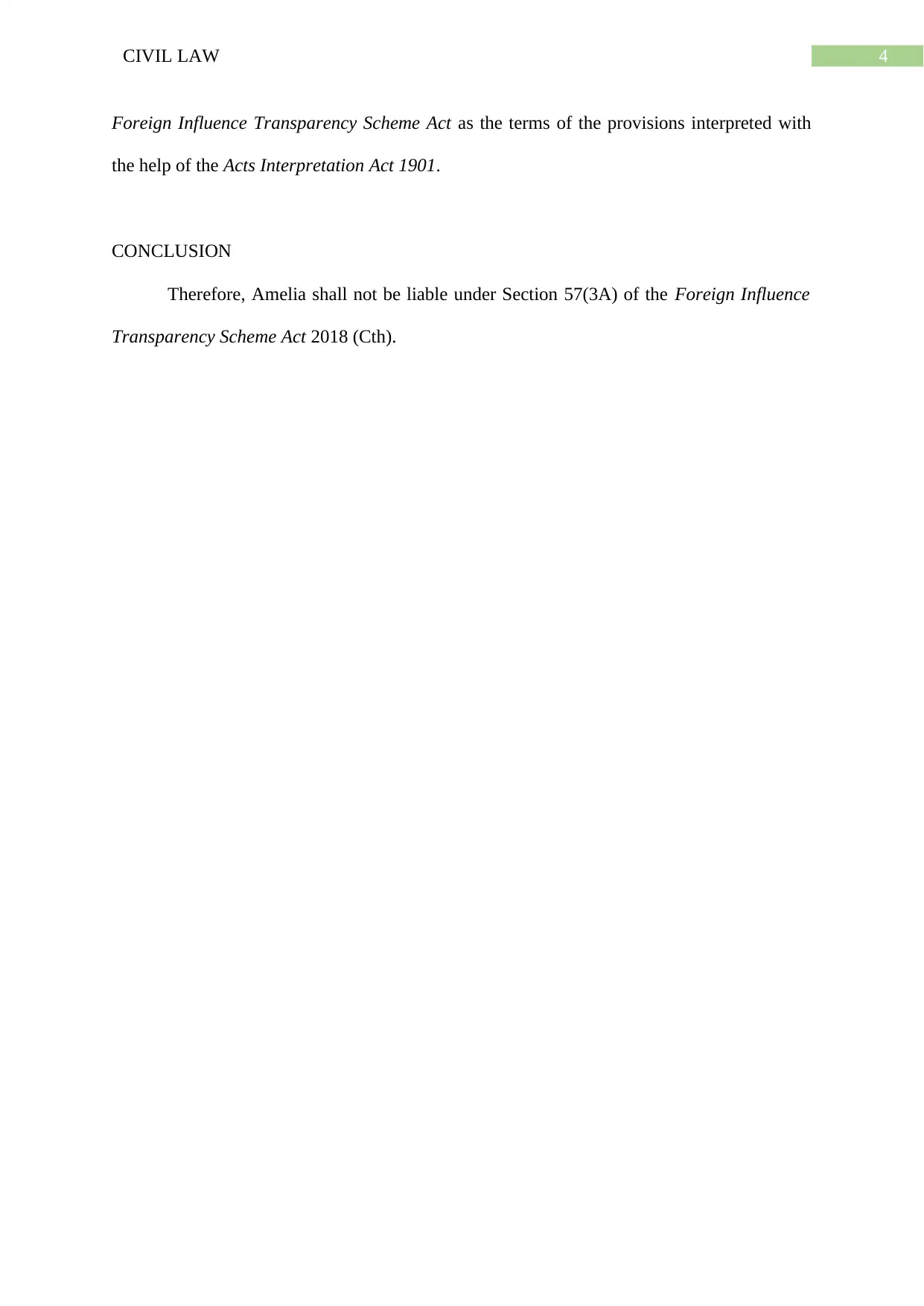
4CIVIL LAW
Foreign Influence Transparency Scheme Act as the terms of the provisions interpreted with
the help of the Acts Interpretation Act 1901.
CONCLUSION
Therefore, Amelia shall not be liable under Section 57(3A) of the Foreign Influence
Transparency Scheme Act 2018 (Cth).
Foreign Influence Transparency Scheme Act as the terms of the provisions interpreted with
the help of the Acts Interpretation Act 1901.
CONCLUSION
Therefore, Amelia shall not be liable under Section 57(3A) of the Foreign Influence
Transparency Scheme Act 2018 (Cth).
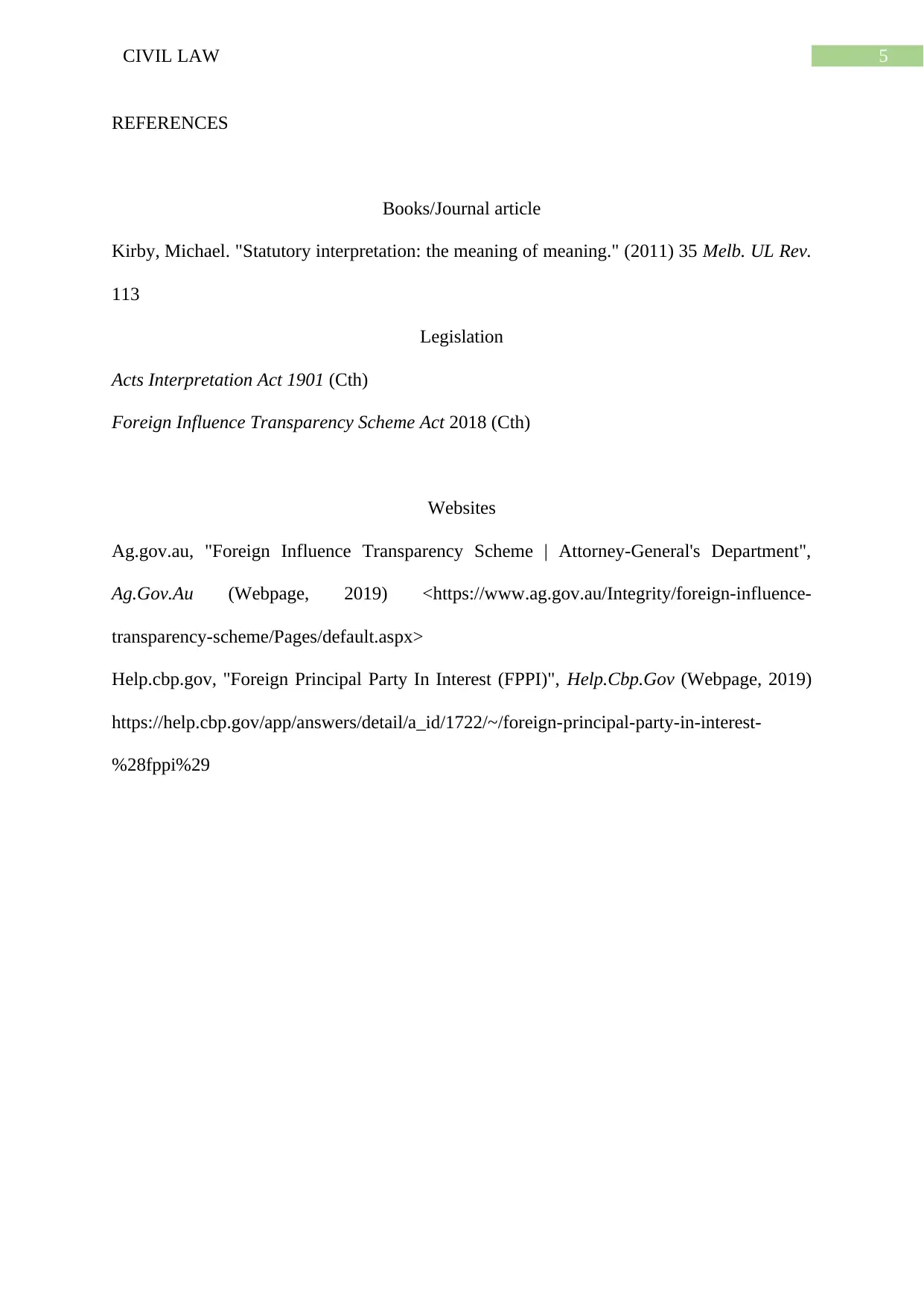
5CIVIL LAW
REFERENCES
Books/Journal article
Kirby, Michael. "Statutory interpretation: the meaning of meaning." (2011) 35 Melb. UL Rev.
113
Legislation
Acts Interpretation Act 1901 (Cth)
Foreign Influence Transparency Scheme Act 2018 (Cth)
Websites
Ag.gov.au, "Foreign Influence Transparency Scheme | Attorney-General's Department",
Ag.Gov.Au (Webpage, 2019) <https://www.ag.gov.au/Integrity/foreign-influence-
transparency-scheme/Pages/default.aspx>
Help.cbp.gov, "Foreign Principal Party In Interest (FPPI)", Help.Cbp.Gov (Webpage, 2019)
https://help.cbp.gov/app/answers/detail/a_id/1722/~/foreign-principal-party-in-interest-
%28fppi%29
REFERENCES
Books/Journal article
Kirby, Michael. "Statutory interpretation: the meaning of meaning." (2011) 35 Melb. UL Rev.
113
Legislation
Acts Interpretation Act 1901 (Cth)
Foreign Influence Transparency Scheme Act 2018 (Cth)
Websites
Ag.gov.au, "Foreign Influence Transparency Scheme | Attorney-General's Department",
Ag.Gov.Au (Webpage, 2019) <https://www.ag.gov.au/Integrity/foreign-influence-
transparency-scheme/Pages/default.aspx>
Help.cbp.gov, "Foreign Principal Party In Interest (FPPI)", Help.Cbp.Gov (Webpage, 2019)
https://help.cbp.gov/app/answers/detail/a_id/1722/~/foreign-principal-party-in-interest-
%28fppi%29
⊘ This is a preview!⊘
Do you want full access?
Subscribe today to unlock all pages.

Trusted by 1+ million students worldwide
1 out of 6
Related Documents
Your All-in-One AI-Powered Toolkit for Academic Success.
+13062052269
info@desklib.com
Available 24*7 on WhatsApp / Email
![[object Object]](/_next/static/media/star-bottom.7253800d.svg)
Unlock your academic potential
Copyright © 2020–2026 A2Z Services. All Rights Reserved. Developed and managed by ZUCOL.





